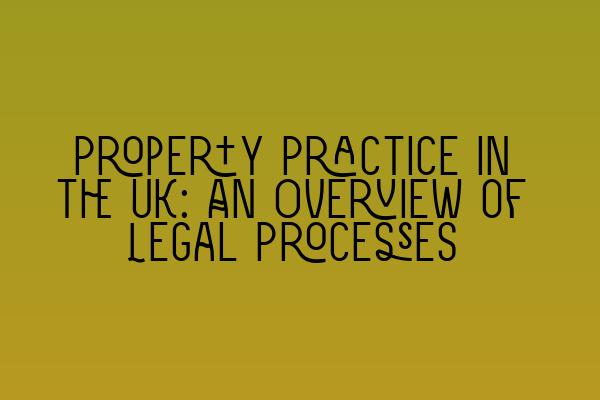Property Practice in the UK: An Overview of Legal Processes
When it comes to property practice in the UK, there are several legal processes that need to be followed in order to ensure a smooth and successful transaction. Whether you are buying or selling a property, leasing or renting, or dealing with any other property-related matters, understanding these legal processes is crucial for both individuals and businesses.
The Conveyancing Process
One of the most important legal processes in property practice is conveyancing. This is the process of transferring the legal ownership of a property from one person to another. It involves several stages, including:
- Pre-contract stage: This is where the buyer’s solicitor investigates the legal title of the property, conducts searches, and raises any necessary enquiries or concerns.
- Exchange of contracts: Once all the necessary checks and inquiries have been completed, the buyer and seller will exchange contracts. At this point, the transaction becomes legally binding, and a completion date is agreed upon.
- Completion: On the agreed completion date, the buyer’s solicitor will transfer the funds to the seller’s solicitor, and the legal ownership of the property will be transferred.
- Post-completion: After completion, the buyer’s solicitor will register the change of ownership with the Land Registry and deal with any outstanding matters, such as paying stamp duty.
It is important to have an experienced property solicitor to guide you through the conveyancing process and ensure that all legal requirements are met.
Lease and Tenancy Agreements
Another important aspect of property practice is lease and tenancy agreements. Whether you are a landlord or a tenant, having a legally binding agreement is essential to protect your rights and obligations.
A lease agreement is a contract between a landlord and a tenant that grants the tenant the right to use and occupy a property for a specified period of time. It sets out the terms and conditions of the tenancy, including the rent, payment terms, duration, and any other relevant obligations.
A tenancy agreement, on the other hand, is a more flexible and short-term arrangement, typically used for residential properties. It is usually renewable on a periodic basis, and it outlines the rights and responsibilities of both the tenant and the landlord.
It is important to ensure that lease and tenancy agreements comply with all relevant laws and regulations, and that they are tailored to the specific needs and requirements of both parties. Consulting a property solicitor can help in drafting and negotiating these agreements.
Landlord and Tenant Disputes
Disputes between landlords and tenants are not uncommon in property practice. These disputes can arise due to various reasons, such as rent arrears, deposit disputes, eviction notices, maintenance issues, or breaches of tenancy agreements.
Resolving these disputes can be complex and time-consuming, often involving negotiation, mediation, or even court proceedings. It is essential to seek legal advice as early as possible to understand your rights and obligations, and to explore all available options for resolving the dispute.
Having a skilled property solicitor by your side can help in navigating through landlord and tenant disputes, ensuring that your interests are protected and that the matter is resolved in a timely and cost-effective manner.
Conclusion
Property practice in the UK involves various legal processes that are essential for any property-related transaction or matter. From the conveyancing process to lease and tenancy agreements, it is important to understand and comply with the relevant laws and regulations.
If you are looking to embark on a career in property law or need assistance with any property-related legal matter, SQE Property Law & Land Law can provide expert guidance and support. Contact us today to learn more.
